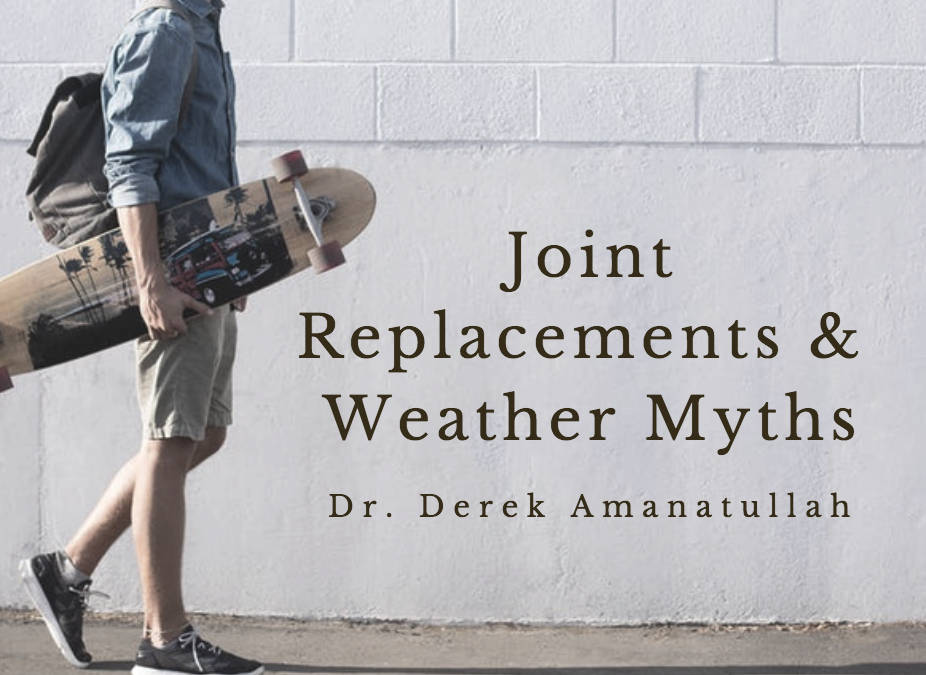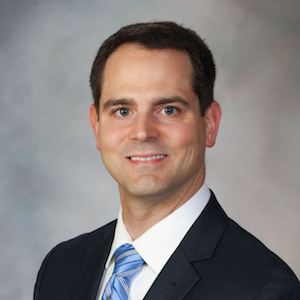Interviewer:
Hello Dr. Amanatullah! How are you doing?
Dr. Derek Amanatullah:
I’m doing great thank you.
Interviewer:
All right let’s talk today about some of the myths that surround weather and joint pain joint replacements all of those things because there’s a lot of them circulating around on the internet so let’s get to dispelling some of them so the number one that people usually come with is arthritis so in your experience in your research does weather affect arthritis at all.
Dr. Derek Amanatullah:
This is a very common complaint that patients complain when it gets warmer colder than they can feel more pain in their drinks this has some really easy explanations and it’s not related to the arthritis itself.
It’s rarely related and it’s not necessarily related to the weather or say what it’s related to high pressure and low pressure fronts.
So your knee or your have is basically a barometer it basically has fluid in it and that fluid in the knee is swollen so it’s under some tension serve patients are blue in their knee are we get doctors call that in a fusion and the pressures are changing around that patients can perceive that as more or less swelling in their knee and that can give them to me.
But the arthritis itself is actually not changing. Its just how much pressure that fluid has.
And really how much pressure that need or have had it to start so you could also imagine an arthritic knee or hip that doesn’t have very much fluid that patient might say yeah I don’t really notice the difference in weather but another patient who has a ton of blue in their knee on and off swelling constantly and they’ll be more susceptible.
So for me I think this is largely related to pressure changes in the environment and how much ** are pressured the patient has in there and you start.
Interviewer:
Excellent but now as far as actually having a joint replacement done is there one season that’s better than another for having the surgery performed.
Dr. Derek Amanatullah:
The short answer is no so a lot of patience do surgery in a seasonal fashion for insurance reasons and I think that’s largely driven walk by or holiday based reasons why people do surgery more often in the winter there’s no downside to doing surgery in any particular season I think it really relates to the activities that you’ll be able to do after the surgery so that may also contribute to why patients may not want their surgery done in the winter it can be in X. some of the activities would like you to do walking particularly or swimming can be inaccessible in nafta season so I think it’s less related to which is better than the other but more related to which is best for that particular patient.
Now you mentioned about walking or swimming or what not in the summer if I’ve had a joint replacement do I need to take any special precautions for the summertime since I’ll be spending more time on my feet doing physical activities.
In general no but there are some precautions you can take that you might want to do in that early part of your surgery so star forms over the course of a year to two years.
As soon as your incision is healed around six weeks time four to six weeks time you can begin to really protect it from a song that can be very important.
Additionally as we talk about water you don’t really want to burst your wound in water in any way so swimming would be set one particular thing jacuzzi or anything else would be or ocean would be another way until the wound is completely healed with no scab just a star on the top.
So I think those the two places where people kind of get themselves into trouble at the extremes the other one is snow so snow is associated with a lot of falling because it can be slippery especially on ice or snow so we really want to make sure that patients are taking really good caution with their gate aids if they’re in a winter environment so I would say you don’t care for falling in the snow.
As far as exertion training these patients I think we can let them exert themselves as they see it I mean that’s kind of why we did the drive replacement we want to protect our wounds from the water and from the side.
Interviewer:
What is the single most common myth that patients come to you with that you wind up having to dispel?
Dr. Derek Amanatullah:
Well, I think it’s related to weather specifically, the other ones would be that you’re trying to get out function better in a particular season I think that’s pretty.
Much related to activity level so really again most of the function of the joint replacement itself is secondary to the muscles so if you’re more active in the winter you gonna notice it functioning better in the winter if you’re more active in the summer then you’ll notice in the summer so it’s really gonna perform based on what you demand of it are the bigger one that comes up is related to kind of running as normally as summer based thing or extreme sports so I think about whether that be surfing or downhill skiing or any other activity that would be of higher demand up for me I think it’s really hard to tell patients that are feeling that well not do those things in general though either not listen to me or they’re asking me because they want my approval to do it I think that’s fine.
But they have to understand that it could compromise the longevity of their joint so I think that the.
Well it’s not a myth or something I dispel I think we really have to counsel patients on how their activity level during the seasons can affect the survival of their joint replacement so the more you use it more cycles get put on it the more it could wear out and we want to make sure they went in the amazing benefits and happiness that gap on the things that they do verse the limits of the engineering of a drier place.
Interviewer:
So if they go on to do some of those extreme sports are they looking at a sooner revision time?
Dr. Derek Amanatullah:
It’s hard to say I mean what I can tell you is that if our patients age if I compare patients under the age of fifty-five patients over the age of fifty-five so let’s just assume for a second the only difference between those patients as their activity level.
It’s true that patients under fifty five bail earlier and faster suit yes the short answer is the more you use your giant replacement the faster it will fail but I mean if I have a sixty-five year old who wants to go back to playing tennis.
Again you have to really weigh how many more cycles is that really is that person really placing their drier place not so much rates that it’s not worth the joy of doing the activities so for me it’s a constant struggle in balance between how much joy and exercise in and hang out with my family my friends and I’m gonna get from that.
Activity versus the number of cycles I’m gonna put on how well done drinker if it’s dole Jr place is not well done and we have a different discussion you probably also won’t enjoy those activities because they might hurt but you can get back to those activities just need to understand what you might pay for the benefits you might get.
Interviewer:
Gotcha well thank you so much for explaining that for us really appreciate it.
Dr. Derek Amanatullah:
Welcome.


